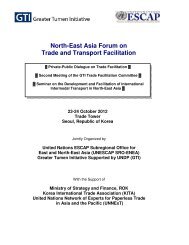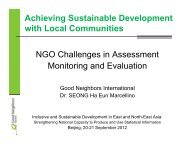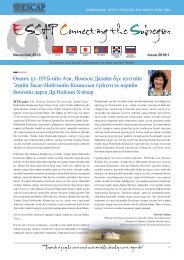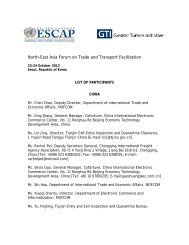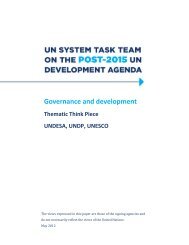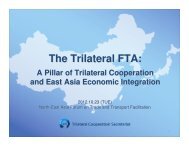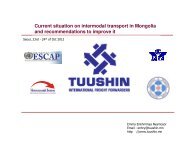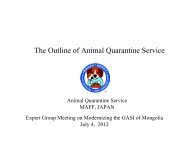Full Report - Subregional Office for East and North-East Asia - escap
Full Report - Subregional Office for East and North-East Asia - escap
Full Report - Subregional Office for East and North-East Asia - escap
You also want an ePaper? Increase the reach of your titles
YUMPU automatically turns print PDFs into web optimized ePapers that Google loves.
THE STATE OF INCLUSIVE AND SUSTAINABLE DEVELOPMENT IN UNCERTAIN TIMES CHAPTER 1<br />
Figure 1.6. Policy rates in selected developing <strong>Asia</strong>-Pacific economies, 2010-February 2013<br />
9<br />
8<br />
7<br />
6<br />
5<br />
4<br />
3<br />
2<br />
1<br />
0<br />
Jan-10<br />
Mar-10<br />
May-10<br />
Jul-10<br />
Sep-10<br />
Nov-10<br />
Jan-11<br />
Mar-11<br />
Percentage<br />
May-11<br />
Jul-11<br />
Sep-11<br />
Nov-11<br />
Jan-12<br />
Mar-12<br />
May-12<br />
Jul-12<br />
Sep-12<br />
Nov-12<br />
Jan-13<br />
China<br />
Indonesia<br />
Philippines<br />
Hong Kong, China<br />
Republic of Korea<br />
Singapore<br />
India<br />
Malaysia<br />
Thail<strong>and</strong><br />
Source: ESCAP, based on data from CEIC Data Company Limited. Available from http://ceicdata.com/ (accessed on 30 March 2013).<br />
Notes: The policy rates <strong>for</strong> each country include rediscount rate <strong>for</strong> China; discount window base rate <strong>for</strong> Hong Kong, China; Reserve Bank of<br />
India repo rate <strong>for</strong> India; Bank of Indonesia month end reference rate <strong>for</strong> Indonesia; Bank of Korea base rate <strong>for</strong> the Republic of Korea; overnight<br />
policy rate <strong>for</strong> Malaysia; repurchase rate <strong>for</strong> the Philippines; overnight repo rate <strong>for</strong> Singapore <strong>and</strong> the 1-day bilateral repurchase rate <strong>for</strong> Thail<strong>and</strong>.<br />
Food <strong>and</strong> fuel price rises have<br />
been exaggerated by the increasing<br />
financialization of commodity markets<br />
As highlighted in the ESCAP 2009 Economic <strong>and</strong><br />
Social Survey of <strong>Asia</strong> <strong>and</strong> the Pacific (ESCAP, 2009a),<br />
food <strong>and</strong> fuel price rises due to concerns about<br />
supply-related shortages have been exaggerated<br />
by the increasing financialization of commodity<br />
markets. Commodity assets managed by financial<br />
investors have increased over the past decade from<br />
less than $10 billion to $404 billion in June 2012.<br />
Loose monetary policies of the developed world,<br />
most notably quantitative easing (QE) in the United<br />
States, along with the unwillingness of governments<br />
to regulate participants in commodity markets, have<br />
continued to draw excess funds to the commodities<br />
markets due to the markets’ comparatively high<br />
expected returns. The presence of financial investors,<br />
betting on an increase in fundamental prices due<br />
to supply shortages, serves to exaggerate price<br />
increases.<br />
The commencement in 2012 of a new round of<br />
QE, referred to as QE3, is expected to contribute to<br />
the pressure as investors are driven into all global<br />
asset classes. In the long-term, with a perception<br />
that food <strong>and</strong> fuel prices are on an increasing trend<br />
due to growing global wealth <strong>and</strong> finite supply, such<br />
commodities present a compelling investment story.<br />
Furthermore, the participation of financial investors<br />
is driven by herd behaviour which suffers from<br />
periods of mass entry <strong>and</strong> withdrawal from such<br />
markets. The resulting volatility in food prices hurts<br />
commodity producers as the accuracy of mediumterm<br />
decisions regarding production based on prices<br />
is jeopardized.<br />
Without regulations that are aimed at managing<br />
the participation of financial investors, price rises<br />
will continue to be exaggerated. Implementation<br />
of legislation agreed under the Dodd-Frank Act in<br />
the United States to limit the holdings of financial<br />
investors in commodity markets which was set to<br />
begin in October 2012, continues to be delayed.<br />
As of December 2012, financial regulators have<br />
issued only 48% of final rules m<strong>and</strong>ated by the<br />
Dodd-Frank Act of 2010, <strong>and</strong> have missed deadlines<br />
<strong>for</strong> implementing 89% of the Act’s provisions<br />
(Government Accountability <strong>Office</strong>, 2013).<br />
27



